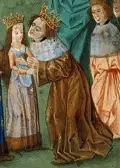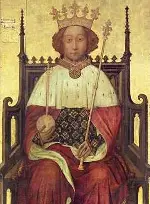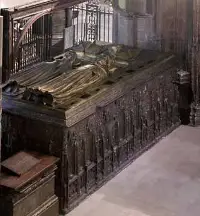King Richard II of England
Richard was born at Bordeaux, in what is then the Duchy of Aquitaine and is now France, on Jan. 6, 1367. He was known for a time as Richard of Bordeaux. At the time, his father, Edward the Black Prince, was leading the fight for England against France in the Hundred Years War. Edward was a spectacularly successful battle commander, counting strategic successes at Crécy and Poitiers among his successes. Richard went to England when he was 4, a year after his sole older brother, Edward of Angoulême, died. The king at this time was his grandfather, Edward III. Richard studied literature and music under the tutelage of his father's boyhood friend Sir Simon de Burley; as a result, Richard was the first English monarch fluent in England and Norman French. Richard's father died in 1376, and Richard was named Prince of Wales, the heir to the throne. King Edward III died the following year, and then 10-year-old Richard was crowned king without incident, at Westminster Abbey on July 16, 1377, just 11 days after his grandfather had died. Edward the Black Prince had been Edward III's oldest son and had predeceased him. When Edward III died, he was survived by three younger sons: John of Gaunt, Duke of Lancaster; Edmund of Langley, Duke of York; and Thomas of Woodstock, Duke of Gloucester. Richard was declared Prince of Wales when his father died in part to forestall attempts by Edward's other sons from making their own claims to the throne. They did not immediately challenge Richard's right to rule. However, because Richard was so young, Parliament had appointed a council to advise him and, effectively, run the kingdom. Among his chief ministers were the Earl of Arundel and Michael de la Pole. Significantly not on this council were any of Richard's uncles. The Hundred Years War was ongoing and was proving expensive. Richard also began to spend large sums of money on himself, his court, and his court favorites. One way that the governing council tried to raise money was with a series of three poll taxes, beginning in 1377. The tax required everyone who was 15 or older to pay one shilling. At the time, that was a significant amount. The reaction to this was so severe that the following year, it became a public uprising, the Peasants' Revolt. Large numbers of poor people, led by Wat Tyler and John Ball, marched on London and demanded change. The uprising turned violent, resulting in the burning of John of Gaunt's Savoy Palace and the deaths of Lord Chancellor and Archbishop of Canterbury Simon Sudbury and Lord High Treasurer Robert Hales. Richard, then 14, met with the leaders of the revolt for two days straight and agreed to meet their demands each day. On the second day, Tyler himself was killed by the Lord Mayor of London, thinking that Tyler was about to kill the king. Richard did not order retaliation; instead, he promised to abide by the terms of the agreement that he had made and promised that those who had rebelled could go home safely. 
On Jan. 22, 1382, Richard married Anne of Bohemia, whose father was the Holy Roman Emperor Charles IV. Anne was not a popular choice with some members of Parliament; in addition, the ships that brought her to England crashed at Dover, prompting many to see it as a bad omen. When Anne died, on June 7, 1394, she and Richard had yet to have a child. This made succession difficult. Richard was so distraught by his wife's death that he ordered Sheen Palace, where she died, razed. 
Against the shadow of continued war with France, England also at this time faced the prospect of war with Ireland. During a lull in the series of conflicts on the Continent, Richard himself led an armed force into Ireland. More than 8,000 strong, this force was the largest force to arrive in Ireland in medieval times. Richard's invasion resulted in a number of Irish chieftains' seeking peace, and Richard returned to England triumphant. He also continued with peace negotiations in the long-running war with France, eventually coming to turns in October 1396; as a result of that agreement, Richard married again, to Isabella, the daughter of France's King Charles VI. Richard's advisers were none too happy with the marriage, particularly because Isabella was then just 6, and said so publicly. They also wanted to continue the war, whereas Richard more wanted peace. One of Richard's most vocal critics, Thomas of Gloucester, had shown a strong hand in dealing with Richard a few years earlier, against the backdrop of fears of a French invasion. Thomas was one of a group of five who effectively ran the government in 1388; the other members of this group, the Lords Appellant, were the Earl of Arundel, the Earl of Derby (Henry Bolingbroke, the future King Henry IV), the Earl of Nottingham, and the Earl of Warwick. The Parliament-authorized council sponsored an armed uprising against the king, which resulted in the Battle of Radcot Bridge, near Oxford, in 1387. The rebelling army defeated Richard's commander and friend, Robert de Vere, the Earl of Oxford, and the Lords Appellant assumed power. Not long afterward, the Merciless Parliament, as it came to be known, dismissed Richard's favorite advisers (including his tutor, Burley), charging them with treason and having many of them killed. In 1389, Richard turned 21, the legal age of ruling, and promptly dismissed the Lords Appellant. He assumed full control of the reigns of government on May 3, 1389, and found some unsuspected support from his uncle, John of Gaunt, who had returned from the Continent after an unsuccessful attempt to put himself on the throne of the Spanish region of Castile. No doubt with the actions of the Merciless Parliament in mind, Richard in July 1397 ordered Gloucester, Arundel, and Warwick arrested. The king had Gloucester, who was his uncle, exiled and then executed. The same fate befell Arundel. The king exiled his own brother, Thomas, who was then Archbishop of Canterbury. Richard then declared himself the absolute head of the realm and returned to the kind of lavish spending that had precipitated the appointment of the Lords Appellant a decade before. He later sent the last two members of the Lords Appellant, the Duke of Norfolk, Thomas de Mowbray, and the Earl of Derby, Henry Bolingbroke, into exile. The two men had publicly quarreled and had pledged to duel each other; Richard banished them instead. In February 1399, John of Gaunt, Richard's uncle and someone that the king had feared would challenge his rule but instead became a strong supporter, died. His oldest son was Henry Bolingbroke, whom Richard had recently exiled. Henry succeeded his father as Duke of Lancaster, but Richard ordered Henry's possessions confiscated. The king summoned Parliament in 1398 and convinced them to invalidate all of the actions taken by the Merciless Parliament a decade before. Further, Richard announced that he was no longer subject to Parliament and that, instead, the powers normally resolved to Parliament would be in the hands of a new council of 18 advisers (12 lords and six commoners), chosen from among the king's friends. He also continued to spend lavish sums on jewelry, metalwork, and art works. He ordered the resumption of a large rebuilding program for Westminster Hall, including 15 life-size statues of kings and a state-of-the-art new roof. Richard decided to make another military expedition into a still unsettled Ireland in May 1399. Two months later, he had lost his crown. Bolingbroke, long his trusted adviser, had built up a considerable following and now had eyes on the throne. Henry returned from exile and confronted Richard, on August 19, and ordered him to surrender. Richard promised to do so if Henry promised to let him live. 
Henry so promised, and Richard so abdicated. Henry ordered the queen captured and taken to Sonning; she returned to France in 1401. Richard, with very few supporters left, signed the order on September 30, when he was in the Tower of London; he was officially deposed the next day. Thus it was that King Henry IV was crowned on Oct. 13, 1399. Henry had intended to honor his agreement to let Richard live but was forced to do otherwise when the details of the Epiphany Rising, an intended coup to restore Richard to the throne, came to light. Parliament ordered that Richard be kept Richard was known as a patron of the arts, especially literature. Among his many diplomats was Geoffrey Chaucer, famous author of Canterbury Tales. As well, primarily with the king as an example, English was more and more spoken, at court and around the country. |
|
Social Studies for Kids
copyright 2002–2024
David White



 Richard II ruled England for a turbulent time in the late 14th Century. He had some successes, at war and peace, but was eventually forced to give up his throne.
Richard II ruled England for a turbulent time in the late 14th Century. He had some successes, at war and peace, but was eventually forced to give up his throne. prisoner, and he was taken away secretly to Pontefract Castle, where he died on February 14, 1400, probably because of starvation. He was eventually placed in Westminster Abbey, in the decorative tomb that he had ordered built for first wife, Anne.
prisoner, and he was taken away secretly to Pontefract Castle, where he died on February 14, 1400, probably because of starvation. He was eventually placed in Westminster Abbey, in the decorative tomb that he had ordered built for first wife, Anne.
